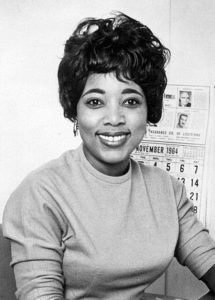Move When The Spirit Says Move
The Legacy of Dorothy Foreman Cotton
The documentary feature film Move When The Spirit Says Move brings to life the story of Dorothy Cotton, the charismatic, courageous and often overlooked colleague of Dr. Martin Luther King, Jr., whose freedom schools, freedom songs, and inspiring messages of hope are profoundly needed today.
This film tells the story of an unsung leader of the Southern Freedom Movement. As Education Director of the Southern Christian Leadership Conference (SCLC), Dorothy Cotton taught thousands of Black people throughout the South about their constitutional rights and the power of nonviolent direct action.
Move When The Spirit Says Move relates Dr. Cotton’s amazing life through her own voice, archival videos, and the testimonies of her colleagues and those of us whom she inspired. We are challenged and encouraged by her to build our democracy and to see ourselves as someone who can change a situation for the better.
Dorothy was dedicated to working for positive change through nonviolent direct action, participatory democracy, and building Beloved Community. Raised in a shotgun shack on a dirt road in Goldsboro, North Carolina, she went on to earn a master’s degree at Boston University, then found her mission with Dr. King at the SCLC. She was part of his entourage to Oslo for his acceptance of the Nobel Peace Prize in 1964.

Cotton attended Dillard High School in Goldsboro. She was later a student at Shaw University in Raleigh, and transferred after one year to Virginia State College in Petersburg, VA. There she studied English and Library Science. She received her Master’s Degree in Special Education and Speech Therapy from Boston University.
Dr. Cotton was the Education Director for the Southern Christian Leadership Conference for twelve years, working directly with Dr. King and preparing many of what he called “the ground crew” in various areas. Dorothy was part of his executive staff and she served as the Vice President of Field Operations for the Dr. M.L.K. Jr. Center for Nonviolent Social Change in Atlanta.
She translated years of experience and learning in words and song bearing messages of hope. Through “Songs of the Movement,” laughter, and storytelling, Dorothy synthesized the lessons from our history into a hardworking vision for the future. Dorothy got us to laugh, sing, and join together to create a more caring and humane world. She was an educator, speaker, singer, peacemaker, and visionary.
Music was important in the Civil Rights Movement, and Dorothy taught America and many other places the songs of the Civil Rights Movement, including “We Shall Overcome.” This theme song of the movement has gone down in history, but it is not the only one.
“We Shall Overcome” is a song that needs to be understood if one is to stay faithful to its origin. It can be sung triumphantly; it can be sung prayerfully. In either spirit, it should be sung with hope and determination for victory, for achieving positive goals.
This song emerged against oppression. It came out of suffering! Dorothy always reminded us that “We Shall Overcome” was—and should remain—a sacred song, a prayer song. It can be sung with joy and great anticipation, and always with hope. “We Shall Overcome” is hope made flesh.
Dorothy Foreman Cotton’s extraordinary story speaks of lifelong engagement and learning. If you have a library card, you can watch the film on www.kanopy.com.
Learn more about Dorothy Cotton at www.wunc.org/arts-culture/2019-07-02/bringing-ncs-dorothy-cotton-out-from-behind-mlks-shadow.





